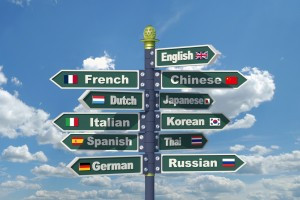The problem with “easy” languages
Medical Pharmaceutical Translations • Sep 28, 2015 12:00:00 AM

Lately, I’ve been seeing a lot of online articles and lists of “the easiest languages to learn.” Some of these lists have even made their way to aiaTranslations’ Facebook page.
Their appeal is totally understandable. And, as an EFL teacher, bilingual, and language lover, I’m all for people learning a new language, regardless of its difficulty level. But there are a few things that bother me about this “easy language” list trend.
For one, as most of these articles will reveal at some point, a language’s difficulty level depends on your linguistic background and knowledge. For example, it’s easier for an English-speaker to learn Spanish than it is for a speaker of Chinese. Although Spanish and English don’t share a ton of similarities, they at least have the same alphabet and a number of cognates, due to the influence of Spanish’s distant cousin, French, on our language. And yes, if you speak French, fellow Romance language Spanish is even easier for you to learn than it would be for a native English speaker.
…But that doesn’t mean a French-speaker will be fluent in Spanish overnight. In fact, a common complaint between speakers of similar languages is that it can be harder to get down their less noticeable differences, like words that are almost the same but have opposite genders in each language.
And that brings me to my biggest pet peeve about the “easy language” promise: no language is easy to learn. Although some may have simpler alphabets, less complex verb conjugations (or none at all), or genderless nouns, all languages take some effort to learn. Experts say that learning a new language is like a workout for the brain. Like a workout for the rest of your body, that means you have to push yourself to see results.
Learning a language involves extensive memorization, and studying culture, customs, and idiomatic expressions. It takes commitment, effort, and discipline. And once you’ve got it down, you have to continue to practice, or else you’ll forget most of it – just like how you have to keep pumping iron to maintain your killer muscle tone.
I’m not writing this to discourage people who click on “easy languages” lists, and I’m not trying to convince people to stop considering learning one of the languages that fall into this (somewhat arbitrary) category. What’s compelled me to write this is to help people not feel disappointed, dumb, or defeated – three things that can very easily make even the most enthusiastic student want to quit. When you start studying a language, it’s important to know what you’re getting into. No language is truly a breeze to learn, and if you struggle with it, that’s completely normal.
Whether you’ve chosen an “easy” language or a harder one to learn, getting into the right mentality is vital. Try to find something you love about the language and/or the culture it’s associated with – this will keep you motivated. Join or create an online or real-life group of fellow students so that you guys can support and help each other. Choose a learning method that works for you. Some people prefer textbooks, while others like conversations. If you think you’d do better with classes, feel free to click here so we can help you get started.
I can’t say learning a language will be easy. But I can honestly tell you that it’s enriching and possibly life-changing – in other words, it’s worth it.
